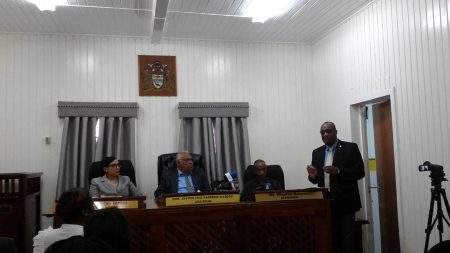The Public Service Appellate Tribunal, which is already examining five cases, is urging public servants who feel that the Public Service Commission (PSC) has not done justice to their respective cases to seek redress.
“Public servants are afraid of everything; public servants are afraid of their bosses, they are afraid of their superiors, they are afraid of their supervisors, but there should be no fear whatsoever. What we have to do is to ensure that the public service ministry and the public service union sensitise and educate and make the public servants aware that they have nothing to be afraid of,” Chairman of the Public Service Appellate Tribunal Justice (Rtd) Nandram Kissoon said on Friday following a dedication ceremony for the body, which was held at its Lot 39 Brickdam, Georgetown office.
“They are free to come to the Public Service Appellate Tribunal at any time. But if it is a decision which was made by the Public Service Commission, they must file their papers within 90 days, that is what the law says,” he added.
The Tribunal was recomposed in May this year after not having been in place for two decades.

Minister of State Joseph Harmon was also present at the dedication ceremony as was Permanent Secretary of the Department of Public Service Reginald Brotherson.
Harmon emphasised that the Tribunal will continue to be accessible to the public and give its decisions in a just transparent and timely manner.
He informed that government has made a commitment to public servants that should they choose to appeal decisions made by the PSC, the Tribunal will be there to offer appropriate guidance and the necessary redress.
Government has said that the reconvening of the Tribunal will provide public servants with a means of recourse in matters of appointments, dismissals or other forms of disciplinary action. President David Granger is on record as saying that the Tribunal is a vital element in the system of public administration as it will ensure professionalism and fairness with regard to promotions and disciplinary action in the public service and will also aid in boosting public servants’ morale.
Since its appointment in May, Justice Kissoon informed on Friday, the Tribunal has received five cases.
He reminded that the work of the Tribunal is dependent on flows from the actions of the PSC.
“We must always remember that our function depends on the functioning of the PSC. Our roadmap flows directly from them. So if we do not have any persons aggrieved by the decisions of the PSC, we have no work. If the PSC doesn’t work, we have no work. Any case that is filed in the registry of the Public Service Appellate Tribunal, we must hear them,” he explained.
The two other members of the Tribunal, Abiola Wong-Inniss and Winston Browne, also urged that public servants familiarise themselves with their rights and the process for appealing decisions made by the PSC.
They highlighted that the services provided were for free and pointed out that given the high cost of legal fees for court matters, the use of the Tribunal should be maximised. “It offers a social net for workers who have been aggrieved, especially those who cannot go to the court and pay attorney’s fees. It is done here, free…. it is far less time and the Tribunal is a court and everything that we do here is prescribed by the law. Many decisions may happen and the public servant may feel they don’t have a fair hearing. The tribunal opens that door to seek redress,” Browne said. “Even in the absence of legal representation, we will be willing to assist every aggrieved person throughout the entire process. So let it not be a deterrent to access,” Wong-Inniss added.
Dawn Gardener, who spoke for President of the Guyana Public Service Union Patrick Yarde, reflected on the role the union played in the call for the establishment of the body.
She pointed to years of complaints of unfair disciplinary action by the PSC.
“[The] Public Service Union has expressed its dissatisfaction with some decisions taken by the [PSC] and petitioned the then PPP government to have an independent body set up to deal with these matters. These dissatisfactions were raised during the sitting of the Collins Commission and a submission was also made to the constituent assembly for the recommendation of an Appellate Tribunal, which should be entrenched in the Constitution of Guyana and for the Constitution to be amended to give public servants the constitutional right to appeal decisions of the [PSC] which were unfair,” she said.
Gardener added that the non-existence of the Tribunal for years had prompted continuous representation by the union to the previous administration since it viewed the non-appointment of the body as unconstitutional and a deliberate denial by the then administration of the public service workers’ rights to redress. “The absence of this Tribunal forced the union to resort to the courts for redress for public workers. This was both expensive and time consuming for the aggrieved public servants to have their matters heard through the court system,” she noted.





